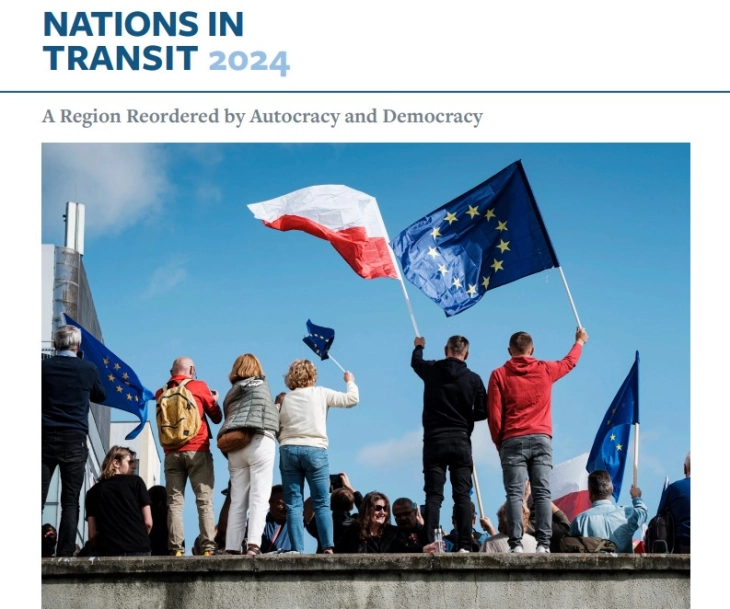North Macedonia records decline in Freedom House’s Nations in Transit 2024 report
- According to the latest Nations in Transit 2024 report published by Freedom House today, North Macedonia remains hybrid regime. The 11 countries designated as hybrid regimes, which have characteristics of both autocracies and democracie, are poised between the region’s two geopolitical and normative blocs. This uncertainty has left their institutions in a vulnerable position, leading overwhelmingly to democratic setbacks rather than triumphs in 2023, as stated in the report.

Skopje, 11 April 2024 (MIA) - According to the latest Nations in Transit 2024 report published by Freedom House today, North Macedonia remains hybrid regime. The 11 countries designated as hybrid regimes, which have characteristics of both autocracies and democracie, are poised between the region’s two geopolitical and normative blocs. This uncertainty has left their institutions in a vulnerable position, leading overwhelmingly to democratic setbacks rather than triumphs in 2023, as stated in the report.
“The Western Balkans accounted for many of the more worrying developments. Serbia experienced a historic decline due to President Aleksandar Vučić’s efforts to consolidate power in 2023. However, North Macedonia is immediately behind Serbia. North Macedonia experienced the largest decline in the region after Serbia. The year was marked by political polarization and inter-party clashes within the ruling coalition, as well as with the opposition. The main opposition party continued to play a markedly obstructive role,” Alexandra Karppi, one of the co-authors of the report, told Voice of America.

North Macedonia suffered from major setbacks to the rule of law and persistent high-level corruption during the year, as parties clashed over constitutional amendments necessitated by Bulgaria’s veto of the country’s EU accession efforts.
North Macedonia is placed under the term “cyclical hybrid.” Among some hybrid regimes, regular changes in the ruling elite bely a lack of meaningful structural change over time. The defining trait of cyclical hybrids is a combination of real political pluralism and superficial institutional change, Freedom House explains this by illustrating it with the case of former Prime Minister Nikola Gruevski, who has been in exile since 2017, in the context of North Macedonia.
“Neither Gruevski nor his closest associates have been brought to justice for their abuses in office before 2017. Worse still, controversial changes to the criminal code in 2023 reduced the penalties for such abuses, causing landmark cases to be thrown out while the public was already reeling from fatal corruption scandals in the health sector,” Karppi said.
According to her, this demonstrates the extent to which the judicial system is politicized. "This year, there have been a series of scandals in the judiciary, such as with the Judicial Council, and subsequently with its head. All of this reflects the failure of the judicial and anti-corruption entities meant to serve the citizens. I believe that currently in North Macedonia, among Macedonian citizens, there is a prevailing sentiment that these institutions are not functioning to serve the people but rather certain individuals," Karppi noted.
“In North Macedonia, the hopes that rose in 2017 after the ouster of antidemocratic prime minister Nikola Gruevski have yet to be realized,” reads the report.
“Unlike Ukraine or Moldova, North Macedonia has not taken major steps to eliminate corrupt patronage networks, and power has continued to oscillate between coalitions of the same handful of parties, as it has for decades. Gruevski’s nationalist party has obstructed the work of the parliament while in opposition and was favored to win the 2024 presidential and parliamentary elections,” reads the report.

“In Bosnia and Herzegovina, the recriminalization of defamation by the Republika Srpska entity in July, as part of a series of concerning legislation on the media and civil society, put undue pressure on journalists in an environment that was already rapidly deteriorating in terms of hate speech and physical safety”, report says.
In Montenegro, the rift between the pre-2020 government and younger officials has led to “ineffective governance, interinstitutional conflict, and a yearlong constitutional crisis.”
Meanwhile, the scores for Hungary, Georgia, and Kosovo remained unchanged, despite a turbulent year for civil society and ordinary citizens in these countries.
The standout case among the Nations in Transit democracies was Poland, where despite unprecedented electoral manipulation and brazen corruption by the ruling party, the opposition won a historic victory at the polls, paving the way for institutional repair.
“Fortunately, the new government has access to an abundance of examples from its neighborhood, where multiple states have already tried—with varying success—to overcome the damage done to institutions by illiberal leaders. The experiences of Slovenia, Czechia, and Slovakia demonstrate the difficulties, pitfalls, and tradeoffs that Poland will face, but they also bear important lessons on how to recover from years of populist misrule,” report says.
According to the Nations in Transition report, democratic governance in the Nations in Transit region declined for the 20th consecutive year in 2023 and a geopolitical reordering is underway in the region stretching from Central Europe to Central Asia.
Photo: Freedom House/ print screen







